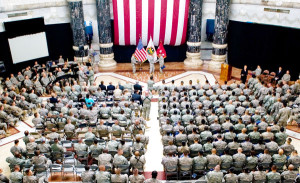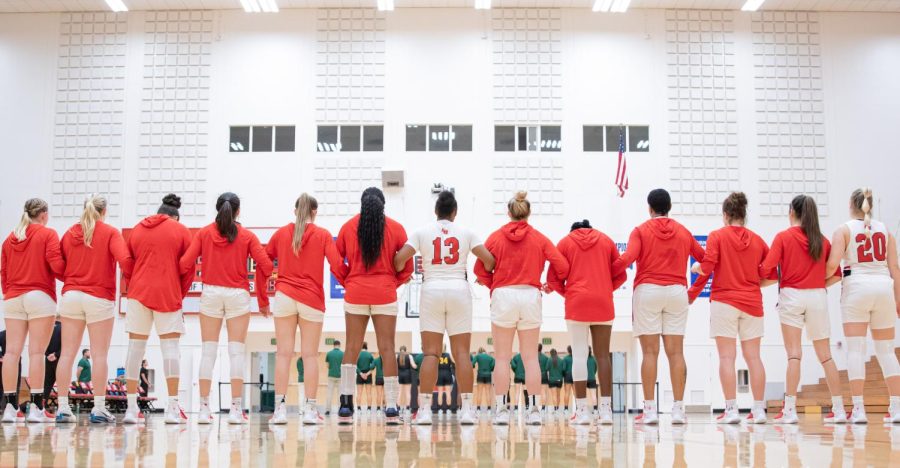
naturalization ceremony to become U.S. citizens.
Amid presidential campaigning for the Hispanic vote, Sen. Marco Rubio, R-Fla., has discussed plans for introducing a modified version of the DREAM Act which, rather than guaranteeing a pathway to citizenship for college attendance or military service, would instead grant non-immigrant visas.
The proposal is being touted as a Republican alternative to the DREAM Act intended to place the party in a more favorable light with Hispanic voters throughout the country.
It should be called for what it is, a blatant insult to the legacy of military service by non-citizens to the United States, especially that of Hispanics.
This DREAM Act “Light” is emblematic of how much immigration reform has become a zero-sum game and the use of any issue relating to it as nothing more than a political pawn, including other proposals surrounding this specific issue.
Rep. David Rivera, R-Fla., introduced the ARMS Act earlier this year, another modification of the DREAM Act which focuses entirely on military service.
Rivera himself told the Miami Herald it would not “ensure automatic residency” never mind any mention of guaranteed pathways to citizenship.
It begs the question of just how much our current political environment would have affected the possibility of citizenship for past foreign nationals who served in the armed forces, individuals like Silvestre Herrera.
During World War II, Herrera – who was born in Mexico and at the time he entered the war was a Mexican citizen — received the Congressional Medal of Honor and Mexico’s highest military award for actions which caused the loss of both his feet in a minefield in Europe while holding down an enemy emplacement with covering fire.
It was only upon receiving his draft notice that Herrera discovered he was not an American citizen and had actually been born in Camarga, Chihuahua. Upon returning home to Arizona he was not only given a hero’s welcome but granted citizenship.
In today’s political environment this same man, who The New York Times reported as saying his reason for answering the draft notice was giving service to “my adopted country that had been so nice to me,” would have been used as a pawn across political battle lines that do not even address the real problem of how citizenship through military service is treated.
Citizenship for military service during times of war or military conflict is already granted automatically by Section 329 of the Immigration and Nationality Act (INA) for service since September 11, 2001, and retroactively granted to those involved in previous wars and conflicts.
Which begs the question: Why is citizenship through military service even part of any of these attempts towards immigration reform?
The simple answer is that military service during peacetime does not guarantee a path to automatic citizenship and leaves the door open for legislative proposals. Furthermore, there are still concerns with how all branches of government treat the classification of military conflicts that Section 329 of the INA covers.
In this political climate there should especially be concerns over how any party in power or the judicial philosophies of judges would affect interpretation of Section 329 towards those who attempt to apply for citizenship.
What is needed is comprehensive legislative establishment that all forms of military service, in both peacetime and wartime, be established as precursors to automatic pathways to citizenship.
The conflicts in Iraq and Afghanistan clearly exemplify the spirit of service to the U.S. in peacetime that exists as thousands of reserve and National Guard members, many who enlisted without the expectation of wartime service, have faced multiple tours and deployments over the past decade.
To put into question whether individuals who volunteer for military service, who due to circumstances completely out of their control never see war or conflict, have not sufficiently exemplified the requirements to become a U.S. citizen is as blatant an insult to the concept of military service as possible.
Upon enlisting for military service every individual must take the Oath of Enlistment and swear or affirm that they “will defend the Constitution of the United States against all enemies, foreign and domestic.” When taking the Oath of U.S. Citizenship, this same statement is made nearly word-for-word.
This service, even at the risk of one’s own life if necessary, to protect the document upon which the U.S. stands is the essence of citizenship in practice. The intent of the individual is clear even if they are not asked to put it directly into practice in the line of fire.
Throughout this country’s history, Hispanics like Herrera and other foreign nationals have stood ready to answer the call of a government and a nation to whom they are not even considered citizens.
It is time to stop the political games we play with their service and ludicrously punishing them for the timing of their service not lining up with our nation being actively at war.
They deserve better.










